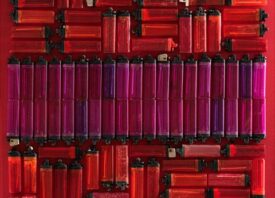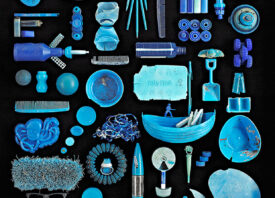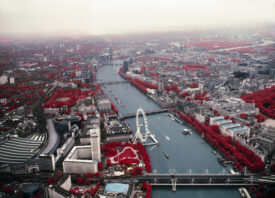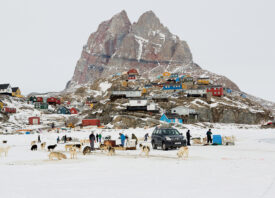Search this site
Artist Sheds Light on Plastic Pollution One Lighter at a Time



“Living near the ocean in southwestern France, I walk my dog, Polok, every day on the beach,” the photographer Eddy de Azevedo tells me. “Where I live, the beaches are magnificent, vast, and wild–but as with many beaches across the world, you cannot help but notice all the trash that’s washed ashore.” While walking Polok, he’s come across lighters, straws, bottles and bottle caps, and all manner of plastic rubbish littered throughout the otherwise pristine beachfront. Eight years ago, he started collecting the objects he found, organizing and photographing them according to color and form.
“I did not know it yet, but those early images were the first in a larger body of artistic work on a single theme: the plastic pollution of our oceans,” he says now. DEAR OCEAN is the culmination of years of work and countless walks along the beach, comprising sixteen individual series of images. “My creative process is still the same as it was eight years ago,” he tells us. “I take advantage of my daily walks and pick up the waste I find: lighters, cotton swabs, plastic bottle caps.
“The trash itself ends up being the element that guides my work. As I gather materials, I start to make associations and come up with ideas. I start new work when I have enough trash to complete it.” De Azevedo is always on the lookout for vibrant colors, a dazzling rainbow of hues that initially belie the work’s far darker subject matter. “I wanted to have a real contrast between the dramatic reality of plastic pollution and my rather playful aesthetic,” he explains.
When creating his compositions, he draws inspiration from the abstract expressionist movement. Some of the photographs draw comparisons with the color fields of Mark Rothko, while others evoke memories of Jackson Pollock’s drip paintings. (Polok, the artist’s canine companion, gets his name from both Pollock, the artist, and Pollok, the Glasgow district where De Azevedo’s wife was born.)
“Every walk has become both a creative moment and a militant action on behalf of the environment,” the artist says now. “I am only a photographer, but I can fight with the weapons I have: my camera, my lenses, and my ideas. DEAR OCEAN is a way–my way–of alerting people young and old about the plastic pollution crisis.”
According to an assessment from the UN Environment Programme, plastic pollution could be on course to double by 2030. That number could triple by 2040. But there is hope: soon, in February and March 2022, UN Environmental Assembly (UNEA) is due to meet to discuss the drafting of a landmark global treaty on plastic pollution.
In the fall of 2021, at approximately the same time as world leaders were discussing a plastic treaty, DEAR OCEAN was exhibited close to home in Hossegor, France, carrying a message of global significance (you can see it virtually here). De Azevedo is also an ambassador with The Beach Cleaners, a community of ocean activists, NGOs, and sports clubs working to protect the ocean.
“Often, it’s after one of these special days spent cleaning that I feel most inspired to create a work using the waste I’ve collected,” he admits. “Group beach cleanings also give me the opportunity to meet more people who are engaged and educated about the problem, and we’ve worked together to organize campaigns and workshops. These kinds of initiatives can have a considerable influence on our daily lives and actions.”
Now, he’s helping the next generation to understand the problem, inviting school groups to participate in workshops. “Many of the participants say that they will change their consumption habits by reducing or abandoning plastic containers,” he tells me. “These changes can be as simple as no longer flushing cotton swabs down the toilets. That’s the beginning of a commitment. The promise of a change is the best reward I can get.”
For more from the DEAR OCEAN project, follow de Azevedo on Instagram at @eddydeazevedo.








All images © Eddy de Azevedo



